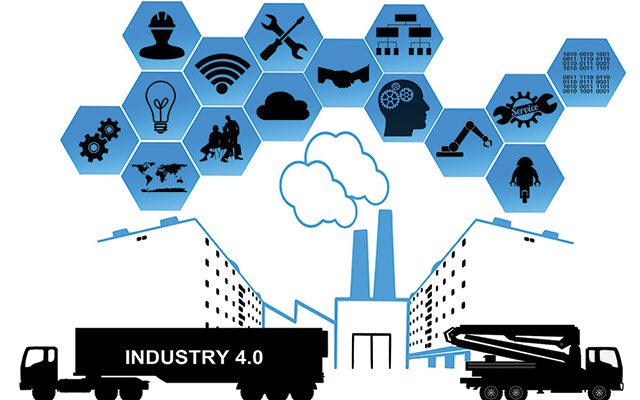First, there was water and steam. Then there was electricity and assembly. Then came digitization. And now we’re watching the emergence of intelligence and technology combining forces.
In the first industrial revolution, construction benefitted from the use of manufactured iron to create stronger, more durable structures combined with manufactured building materials, which reduced time delays. The power of steam fueled machinery that made building easier and faster.
In the second, steel production was mass-manufactured, allowing for high-rise and long-span construction. Chemical processes were becoming more common practice, allowing for a mix of materials to be used on the jobsite.
The third revolution focused largely on technology and electronic implementation, and one could argue that construction all but skipped over most of this phase given the heavy content present in today’s world on how the construction industry is seriously lagging in the digitization department.
Industry 4.0
The 4th industrial revolution (referred to as Industry 4.0 or I4.0 for the techiest among us), is happening at lightning speed. We’re watching smart technologies evolve into intelligent devices capable of monitoring and adjusting settings in your home, alerting us when danger is near on the jobsite, answering questions at the drop of a hat, and more.
This next step on the path to growth and development involves four key areas:
- Interconnection
Relationships and communication is no longer limited to the human experience. Now, machines, devices, sensors, and people can all talk, interact, and connect with each other to exchange information and learn from experiences. In the case of digital, those learned things are still very black and white and conditionally based. - Transparency
The explosion of digitization in the last few decades amassed data that carries valuable insights. This information is capable of providing clarity into how systems function, where they get stuck, and how they could work better. As big data continues to grow, informational transparency will continue to be more precise. - Assistance
Smart technology on the jobsite (and many other labor-intensive professions) enables difficult, taxing work to happen faster with less physical strain on the human body. Lifting heavy objects, handling repetitive tasks, and taking over tasks that are dangerous frees up humans to focus on more complex problems. - Decentralized decisions
Some decisions simply require a pass/fail, yes/no, black/white approach that’s time-consuming. By automating these decisions with smart technology, teams can focus on the creative problem-solving aspect of the jobsite.
The Rise of Big Data
As Industry 4.0 continues to gather steam, the role of big data in many industries will grow. Construction has already seen the benefits of big data, but as smart technologies become more and more integrated on the jobsite and involved in every phase of construction, this data will be crucial to maximizing their effectiveness.
Big data’s role for machine learning and artificial intelligence are similar to those in factory and cyber-physical system settings. This is sometimes known as the 6C system:
- Connection (sensor and networks)
- Cloud (computing and data on demand)
- Cyber (model & memory)
- Content/context (meaning and correlation)
- Community (sharing & collaboration)
- Customization (personalization and value
What Does Industry 4.0 Mean for Construction?
All of this advanced technological revolution means the construction industry will only continue to improve. Supply chain management and optimization will use the abundance of big data to provide clear visibility and more control into the process. Predictive analytics combined with digital twins will prevent rework, further enhancing project turnaround times while reducing costs. Asset tracking will gain momentum, becoming more accurate thanks to big data on the back end. Logistics will be more effective and efficient, quality control will increase, and inventory can be more closely monitored.
So what are the big benefits to the construction industry from the 4th revolution?
- Companies can remain agile and competitive thanks to adopting smart technology
- Companies will appeal more to young hires when they embrace digital technologies and processes
- Collaboration continues to increase as technology gets smarter, faster, and better connected
- Issue prevention happens as communication improves thanks to technological advances
- Lean operations will become more realistic thanks to the assistance of co-bots and machine intelligence
- Better decision-making based on real-time information will take place as technologies are adopted and full integration happens with all systems
All of this leads to business opportunities and revenue growth.
Don’t Forget to Connect
In order to maximize use of these exceptional tools, you’ll need to ensure that you can connect them no matter where you are. You need a team you can rely on to have your connection in place and operating reliably. You need speed and bandwidth. You need a turnkey provider to get your construction crew up and running from the moment the bid is won.
How to Adapt to Industry 4.0
With all of this revolution will come glitches, bugs, and setbacks. As we become more reliant on devices, secure connections will always remain a challenge. Regulations on smart technologies are still out.
Additionally, data integrity must be challenged and preserved, and redundancies should always be in place should one system fail.
Beyond the practicalities, it’s critical to seek buy-in throughout your entire organization from the bottom-up and top-down. Input from each level should be taken into consideration. This provides opportunity to introduce technology that could further your business goals while resolving your employee’s pain. Further, without buy-in, your implemented change will meet resistance or dismissal altogether. Without complete adoption, systems won’t work to reduce or improve current issues.
This means it’s important to clearly communicate what changes mean for your company and for your jobs. Many people hear automation and immediately think job cuts. Communicate that trainings will take place. Reliability and speed internally will improve. Talk to the benefits and how this will make your employee’s days better.
Industry 4.0 has already begun. Are you prepared?






